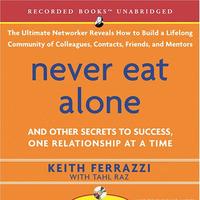5. CHAPTER 1 - Becoming a Member of the Club
Over the years, I learned that the outrageous number of misperceptions clouding those who are active relationship-builders is equaled only by the misperceptions of how relationship-building is done properly.
What I saw on the golf course—friends helping friends and families helping families they cared about—had nothing to do with manipulation or quid pro quo. Rarely was there any running tally of who did what for whom, or strategies concocted in which you give just so you could get. Over time, I came to see reaching out to people as a way to make a difference in people's lives as well as a way to explore and learn and enrich my own; it became the conscious construction of my life's path.
Once I saw my networking efforts in this light, I gave myself permission to practice it with abandon in every part of my professional and personal life. I didn't think of it as cold and impersonal, the way I thought of "networking." I was, instead, connecting— sharing my knowledge and resources, time and energy, friends and associates, and empathy and compassion in a continual effort to provide value to others, while coincidentally increasing my own. Like business itself, being a connector is not about managing transactions, but about managing relationships. People who instinctively establish a strong network of relationships have always created great businesses.
If you strip business down to its basics, it's still about people selling things to other people. That idea can get lost in the tremendous hubbub the business world perpetually stirs up around everything from brands and technology to design and price considerations in an endless search for the ultimate competitive advantage. But ask any accomplished CEO or entrepreneur or professional how they achieved their success, and I guarantee you'll hear very little business jargon. What you will mostly hear about are the people who helped pave their way, if they are being honest and not too caught up in their own success. After two decades of successfully applying the power of relationships in my own life and career, I've come to believe that connecting is one of the most important business—and life—skill sets you'll ever learn.
Why? Because, flat out, people do business with people they know and like. Careers—in every imaginable field—work the same way. Even our overall well-being and sense of happiness, as a library's worth of research has shown, is dictated in large part by the support and guidance and love we get from the community we build for ourselves. It took me a while to figure out exactly how to go about connecting with others.
But I knew for certain that whether I wanted to become president of the United States or the president of a local PTA, there were a lot of other people whose help I would need along the way.

